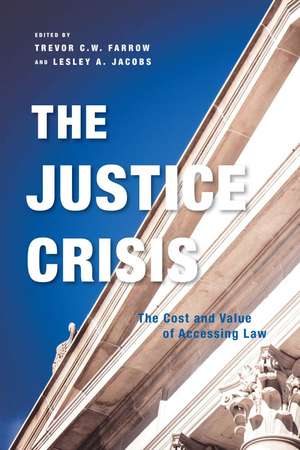The Justice Crisis: The Cost and Value of Accessing Law: Law and Society
Editat de Trevor C. W. Farrow, Lesley A. Jacobsen Limba Engleză Paperback – 30 apr 2021
Contributors to this wide-ranging overview of new empirical research address several key issues: the extent and cost of unmet legal needs; the role of public funding; connections between legal and social exclusion among vulnerable populations, including indigenous communities; the value of new legal pathways; legal fee structures; the provision of justice services that go beyond the courts and lawyers; and the need for a culture change within the justice system. Their findings can inform initiatives to improve access to justice within the Canadian system and beyond.
Din seria Law and Society
- 23%
 Preț: 513.75 lei
Preț: 513.75 lei -
 Preț: 319.81 lei
Preț: 319.81 lei -
 Preț: 319.21 lei
Preț: 319.21 lei -
 Preț: 277.39 lei
Preț: 277.39 lei - 23%
 Preț: 588.75 lei
Preț: 588.75 lei -
 Preț: 261.71 lei
Preț: 261.71 lei -
 Preț: 404.27 lei
Preț: 404.27 lei - 18%
 Preț: 632.36 lei
Preț: 632.36 lei -
 Preț: 214.78 lei
Preț: 214.78 lei -
 Preț: 281.84 lei
Preț: 281.84 lei -
 Preț: 411.42 lei
Preț: 411.42 lei -
 Preț: 508.24 lei
Preț: 508.24 lei -
 Preț: 454.22 lei
Preț: 454.22 lei -
 Preț: 423.63 lei
Preț: 423.63 lei -
 Preț: 442.89 lei
Preț: 442.89 lei -
 Preț: 136.15 lei
Preț: 136.15 lei -
 Preț: 330.86 lei
Preț: 330.86 lei - 23%
 Preț: 551.55 lei
Preț: 551.55 lei - 23%
 Preț: 549.21 lei
Preț: 549.21 lei - 23%
 Preț: 549.54 lei
Preț: 549.54 lei - 21%
 Preț: 510.01 lei
Preț: 510.01 lei - 23%
 Preț: 550.15 lei
Preț: 550.15 lei - 23%
 Preț: 521.78 lei
Preț: 521.78 lei - 9%
 Preț: 611.61 lei
Preț: 611.61 lei -
 Preț: 328.51 lei
Preț: 328.51 lei - 9%
 Preț: 553.95 lei
Preț: 553.95 lei -
 Preț: 393.81 lei
Preț: 393.81 lei -
 Preț: 229.74 lei
Preț: 229.74 lei -
 Preț: 328.66 lei
Preț: 328.66 lei -
 Preț: 301.57 lei
Preț: 301.57 lei - 16%
 Preț: 670.53 lei
Preț: 670.53 lei - 23%
 Preț: 651.28 lei
Preț: 651.28 lei - 27%
 Preț: 700.04 lei
Preț: 700.04 lei - 19%
 Preț: 493.24 lei
Preț: 493.24 lei
Preț: 305.99 lei
Nou
Puncte Express: 459
Preț estimativ în valută:
58.57€ • 60.36$ • 49.44£
58.57€ • 60.36$ • 49.44£
Carte disponibilă
Livrare economică 10-24 februarie
Livrare express 24-30 ianuarie pentru 40.14 lei
Preluare comenzi: 021 569.72.76
Specificații
ISBN-13: 9780774863582
ISBN-10: 0774863587
Pagini: 368
Ilustrații: 26 figures, 19 tables
Dimensiuni: 152 x 229 x 30 mm
Greutate: 0.57 kg
Editura: University of British Columbia Press
Colecția University of British Columbia Press
Seria Law and Society
ISBN-10: 0774863587
Pagini: 368
Ilustrații: 26 figures, 19 tables
Dimensiuni: 152 x 229 x 30 mm
Greutate: 0.57 kg
Editura: University of British Columbia Press
Colecția University of British Columbia Press
Seria Law and Society
Recenzii
"The Justice Crisis is required reading for anyone who desires a just society. At once thoughtful and bold, this compendium offers insightful ideas on how we can take access to justice from slogan to reality."—Beverley McLachlin, former Chief Justice of the Supreme Court of Canada
"Farrow and Jacobs are to be congratulated on bringing together a wealth of new empirical evidence, shining an original light on the access to justice crisis in civil and family law. The volume provides a rich source of innovative thinking about the complex issues of cost and value of access to justice, while underlining the need for better evidence to support service and system transformation."—Dame Hazel Genn, author of Paths to Justice: What People Do and Think about Going to Law
"The Justice Crisis is required reading for anyone who desires a just society. At once thoughtful and bold, this compendium offers insightful ideas on how we can take access to justice from slogan to reality."
Farrow and Jacobs are to be congratulated on bringing together a wealth of new empirical evidence, shining an original light on the access to justice crisis in civil and family law. The volume provides a rich source of innovative thinking about the complex issues of cost and value of access to justice, while underlining the need for better evidence to support service and system transformation.
Notă biografică
Trevor C.W. Farrow is a professor and former associate dean at Osgoode Hall Law School, and the chair of the Canadian Forum on Civil Justice. His books include Civil Justice, Privatization, and Democracy and The Theory and Practice of Representative Negotiation. Lesley A. Jacobs is vice-president of research and innovation at Ontario Tech University and York Research Chair in Human Rights and Access to Justice at York University. He was appointed a fellow of the Royal Society of Canada (FRSC) in 2017 and has written or edited numerous books, most recently Grey Zones in International Economic Law and Global Governance.
